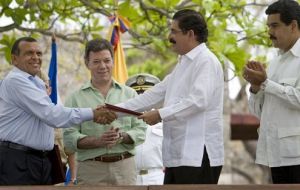MercoPress. South Atlantic News Agency
Zelaya is cheered on return to Honduras; June first OAS votes on reinstatement
 The former president is back following an agreement brokered by Colombia and Venezuela presidents
The former president is back following an agreement brokered by Colombia and Venezuela presidents Honduran former president Manuel Zelaya, whose ouster almost two years ago led to Honduras’ expulsion from the Organization of American States, OAS, returned home from exile Saturday following an agreement brokered by Colombia and Venezuela
The move is expected to allow the country’s reinstatement into the regional group and even more important national reconciliation, based on the terms of the accord that opened the way for his return.
Zelaya arrived at Tegucigalpa’s international airport from Nicaragua in a plane belonging to Venezuelan state-run airline Conviasa. He was accompanied by his family and a delegation of international allies, including former Panamanian President Martin Torrijos, Venezuela Foreign Minister Nicolas Maduro and Colombian Foreign Minister Maria Angela Holguín.
“Thanks to your efforts I’ve been able to return to my land” he told a crowd who had come to welcome him. Many were dressed in red in a show of solidarity with Zelaya’s National Popular Resistance Front, a coalition that advocated his return. “Your presence here this afternoon, and international support, shows that blood was not spilt in vain.”
Honduran elected President Porfirio Lobo signed an agreement May 22 with Zelaya, allowing him to return from exile and help change the country’s laws. The agreement, brokered with the help of Colombian President Juan Manuel Santos and Venezuelan President Hugo Chavez, also guarantees that Zelaya supporters can return safely to Honduras and form a party to participate in elections.
Zelaya later in the day joined President Lobo and has a meeting scheduled with OAS Secretary General Jose Miguel Insulza. The vote to restore Honduras to the OAS will occur June 1, according to a resolution passed May 24 in Washington.
Honduran soldiers put Zelaya on a plane to Costa Rica in June 2009 after the country’s Supreme Court ruled, with support from Congress, that his push to rewrite the constitution and extend presidential term limits was illegal. On May 2, a court dropped the last of the remaining charges against the former president.
Zelaya, who spent more than four months in the Brazilian Embassy in Tegucigalpa after sneaking back into Honduras last year, has since remained in exile in the Dominican Republic..
Lobo's government is now recognized by the United States, the European Union, Central American countries and Colombia but has not won entry back into the OAS.
A former businessman who sports a cowboy hat and thick moustache and is a big landowner in Honduras, Zelaya elected in 2006 fell into the arms of President Chavez unable to address the country’s soaring bills. Honduras together with Haiti and Bolivia is among Latam’s poorest country and lives off international handouts, special access to the US market and tourism.




Top Comments
Disclaimer & comment rules-

-

-

Read all commentsHaving Colombia and Venezuela mediating an issue to achieve one and the same goal shows how much progress in S.A. unity there's been in less than a year. This is thanks to Unasur. Every one knows that if the issue had been left at hands of the US and the OAS, as is traditional, relations between those two countries wouldn't have been restored, and stability in the region would be threatened.
May 30th, 2011 - 01:29 am 0I think this is simply down to Colombia and Venezuela showing they can work together after some pretty heavy business; not Unasur, and not the USA or the OAS.
May 30th, 2011 - 07:34 pm 0I don't agree that having Honduras outside the OAS 'threatened the stability of the region' (Central America); Honduras never had or has that level of importance in the region.
Zelaya says “Your presence here this afternoon, and international support, shows that blood was not spilt in vain.”
I don't remember a bloody coup or revolution, perhaps I missed it.
Anyway, I guess we just have to wait and see who the next politicians and media people to be murdered turn out to be.
God help Honduras.
And I hope the Brasilian embassy was handed back to Brasil in good order and with all the files intact.
Of course you don't think the coup threatened stability in the region, since you supported it.
Jun 01st, 2011 - 01:52 am 0And the fact that Colombia and Venezuela can now work together is possible in a large degree due to Unasur's efforts to de-escalate tensions between the two countries. That the current Colombian president is more of a pragmatist and a Latin Americanist and less of a megalomaniacal than his predecessor, Álvaro Uribe, helped immensely.
”Lest one think that U.S. weakness is exclusively a Middle East issue, take a look at Honduras. The United States had virtually endorsed the coup against now former President Zelaya. Because of the coup, Honduras was suspended from the Organization of American States (OAS). The United States then struggled hard to get Honduras restored to full membership in the OAS on the grounds that a new president had been formally elected. Latin American governments resisted this because Zelaya had not been allowed to return with all phony legal charges dropped.
”What happened next? Colombia (supposedly the U.S.'s best friend in Latin America) and Venezuela (supposedly the U.S.'s nemesis in Latin America) got together and jointly arranged with the Honduran government in power Zelaya's return under Zelaya's conditions. Secretary of State Clinton smiled wanly at this de facto rebuff to U.S. diplomacy.”
http://www.agenceglobal.com/Article.asp?Id=2571
Commenting for this story is now closed.
If you have a Facebook account, become a fan and comment on our Facebook Page!